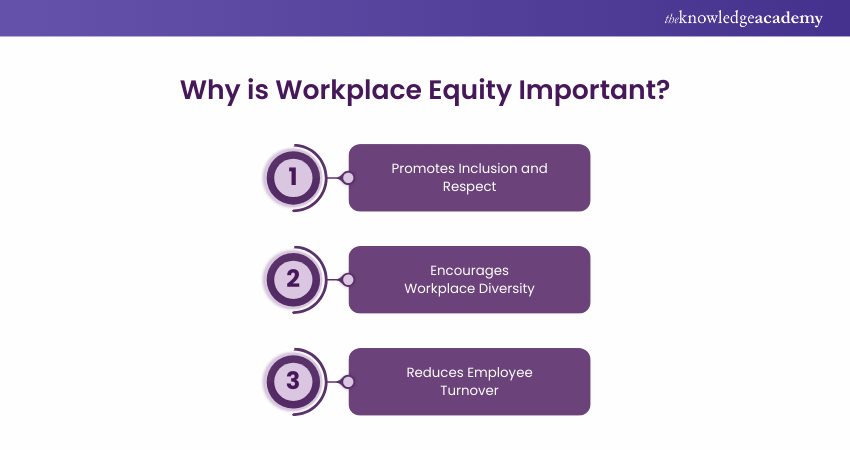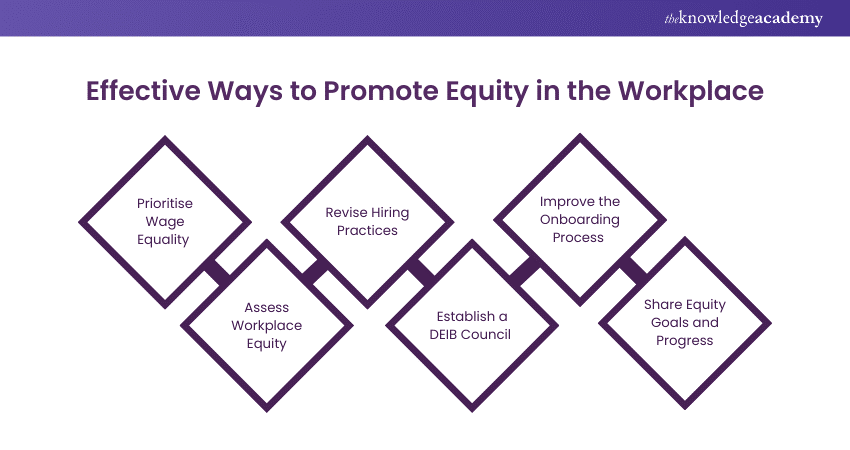We may not have the course you’re looking for. If you enquire or give us a call on 800969236 and speak to our training experts, we may still be able to help with your training requirements.
Training Outcomes Within Your Budget!
We ensure quality, budget-alignment, and timely delivery by our expert instructors.

Equity in the Workplace has become a cornerstone of a thriving, dynamic organisation. It's more than just a policy or a buzzword—it's the foundation that ensures all employees have the necessary tools, resources, and opportunities for their success. When companies prioritise equity, they create an environment where every individual feels valued and supported, leading to stronger teams, better Decision-Making, and increased innovation.
But what does Equity in the Workplace truly mean, and how can organisations achieve it? Equity goes beyond simply offering the same resources to everyone—it recognises that different employees have different needs and challenges. In this blog, we’ll dive deep into the concept of equity, its importance in creating a positive work culture, and practical strategies to promote it.
Table of Contents
1) Understanding Equity
2) Key Principles of Fairness and Equity
3) Examples of Equity in the Workplace
4) Effective Ways to Promote Equity in the Workplace
5) Benefits of Promoting Equity in the Workplace
6) Strategies to Promote Equity in the Workplace
7) How Equity Can Improve Employee Retention?
8) Conclusion
Understanding Equity
Equity is a construct which originated from the perspective of fair treatment. There is a world of difference between equality-the view that every participant must have equal assets and resources-and equity, which considers the differences in individuals' needs, conditions, and starting points. In the workplace, it means bringing all people to a level playing field so that everyone's idea of being at their best can work out fairly.
What is Equity in the Workplace?
Workplace equity is ensuring that all employees have access to those resources, opportunities, and support necessary for work at a high level. Workplaces of this nature are recognising that not everyone starts from the same platform and, thus, requires an adjustment for balancing those differences.
This may mean your compensation could be equitably distributed, or extra support and receptivity for people with disabilities could be taken into consideration or implementing cultural diversity practices.
It means all Employees can feel they are being treated justly, with policies followed by the company. Equitability gives the same thing to everybody, but equity tries to provide what people really need to succeed. It is a mindset that prioritises fairness and attempts to take down barriers preventing different groups of people from advancing inside an organisation.
Why is Workplace Equity Important?
Workplace equity is very important because it creates room for inclusion and respect. When people feel they are being treated evenly and fairly, they will be more engaged, productive, and loyal to the organisation.

1) Promotes Inclusion and Respect: Equity ensures that employees feel treated fairly, which leads to higher engagement, productivity, and loyalty to the organisation.
2) Encourages Workplace Diversity: Equity fosters a culture that embraces diverse backgrounds and perspectives. This diversity of thought may result in better decision-making, increased creativity, and a wide range of ideas, keeping the company competitive in a globalised world.
3) Reduces Employee Turnover: Employees are unlikely to leave when they feel valued, supported, and given fair opportunities. Lack of equity risks resentment, unhealthy competition, and eventual talent loss.
Key Principles of Fairness and Equity
To create an equitable workplace, business needs to focus on a few main concepts:
1) Fairness: Ensure that employees are not only treated equally but also provided with necessary adjustments or accommodation to create equal opportunities for all.
2) Inclusivity: Create a work environment where every individual, despite of background or circumstance, feels welcomed, valued, and respected.
3) Continuous Improvement: Commit to regularly evaluating and enhancing workplace practices to meet the evolving needs of the workforce, ensuring that equity is always upheld.
Examples of Equity in the Workplace
To understand what equity more generally looks like, let's drill down into some real-life examples of how organisations can build equity.
1) Disclosing Wage Data
One effective way of ensuring fairness is to publish wage Data. Salaries need to be publicised for everyone in the company. This makes the companies perceived as making fair pay. Transparency reveals wage gaps attributed to either gender, race group, or any other group. Workers honour transparency since it informs them that an employee's remuneration is only for their work.
2) Offering Diversity Training
Diversity training is another key area related to the promotion of equity at work. In this, employees learn about unconscious biases and culture and are also encouraged to foster Diversity in their workplaces. Providing ongoing training can empower employees to appreciate equity in some aspects while encouraging even more thoughtful and inclusive behaviour.
3) Accommodating Health Conditions or Disabilities
Workplace equity also reaches out to including workers with health conditions or disabilities so that employees have what they need to do their jobs effectively. This could be through accessible workspaces, flexible schedules, or the ability to work from home. All these accommodations help ensure that every employee, regardless of physical or mental condition, can perform optimally.
Want to set new benchmarks for your business ethics goals? Register for our Ethics in Workplace Training - Join today.
Effective Ways to Promote Equity in the Workplace
To advance equity, a business would need to operate in ways that are conscious, committed, and sustained. Here are some practical ways companies can start working towards an equitable environment.

1) Prioritise Wage Equality
Work equality involves wage equity. Perform regular salary audits to identify unjustified pay disparities among employees performing basically the same job. In doing so, employers can work toward reducing unequal pay for equal work based on race, colour, national origin, sex, or other arbitrary factors.
2) Assess Workplace Equity
Traditional evaluations of workplace equity can also enable businesses to determine what is needed to be improved. Employee surveys, anonymous feedback, and Data Analysis can all bring insight into how fair the workplace is supposed to seem to its employees. Businesses can then proactively improve gaps in equity across departments in the workplace.
3) Revise Hiring Practices
Hiring practices can be revamped without biases only when equity is promoted. In fact, companies must focus on how to shape a Recruitment Process that cares about diversity - perhaps blind resume reviews or structured interviews. This reduces unconscious bias and allows the best qualified, regardless of background, to get the opportunities.
4) Establish a DEIB Council
Establishment of a Diversity, Equity, Inclusion, and Belonging (DEIB) council sets out guaranteeing that equity promotion remains in the company's agenda. This council checks the company's policies with regularity and tends to recommend changes and advocate for employees with special needs. A good DEIB council will act as a middle force between the leadership and employees to ensure efficiency in carrying out equity-related activities.
5) Improve the Onboarding Process
Proper onboarding is the most vital practice that sets the tone regarding workplace equity. Ensure that all new hires are provided with all the relevant resources and support in the form of a customised program of their needs. This could mean providing them with specific mentors, training them on understanding the general culture of the company, or addressing accessibility concerns they may have from the start.
6) Share Equity Goals and Progress
Transparency on equity promotion, including the goal of the company on equity, progress, and what needs to improve, should be shared among employees. In this manner, business is credited to become responsible, and collective effort is enhanced in reaching equity.
Benefits of Promoting Equity in the Workplace
Promoting Equity in the Workplace is crucial for fostering a fair, inclusive, and supportive environment. It benefits both employees and organisations by improving morale, innovation, and retention while attracting top talent. Some of the benefits of promoting Equity in the Workplace are:
1) Higher Employee Satisfaction: Equity improves morale, making employees feel respected and supported, which increases loyalty and productivity.
2) Reduced Turnover Rates: Employees are unlikely to leave when they feel valued, leading to improved retention.
3) Fosters Innovation: An equitable environment encourages diverse perspectives, resulting in creative problem-solving and better decision-making.
4) Attracts Top Talent: Companies known for promoting equity appeal to job seekers who prioritise fairness and inclusivity in their workplace choices.
Strategies to Promote Equity in the Workplace
Implementing Equity in the Workplace requires a thoughtful, long-term approach. By setting clear goals, creating actionable plans, and securing leadership support, businesses can ensure lasting equity for all employees.
1) Identify Key Equity Goals: Focus on eliminating pay disparities, improving accessibility, or diversifying leadership.
2) Create a Plan of Action: Develop concrete steps such as revising policies, offering training, or establishing programs to support underrepresented groups.
3) Leadership Involvement: Ensure senior leaders champion equity initiatives, setting an example for the organisation to follow.
4) Regular Progress Reviews: Continuously review, celebrate successes, and adapt strategies to keep equity efforts at the forefront of business operations.
How Equity Can Improve Employee Retention?
Workplace equity significantly boosts employee retention by fostering a sense of value, support, and fairness. When employees feel respected, they remain more engaged and loyal to the organisation. Here’s how equity can improve employee retention:
1) Enhances Employee Loyalty: Valued and supported employees are more likely to stay with their employer, boosting engagement and productivity.
2) Reduces Turnover: Fair treatment and equal opportunities decrease frustration and resentment, leading to lower turnover rates.
3) Fosters a Respectful Culture: An equitable environment builds a culture of respect and belonging, reducing the likelihood of employees leaving for other opportunities.
Build trust, boost morale, and drive success. Master the art of ethical leadership with our Business Ethics Course – Join now.
Conclusion
Promoting Equity in the Workplace is more than just a moral obligation; it's a smart business strategy. When companies commit to fairness and inclusivity, they build a culture where every employee feels being valued, respected, and empowered to succeed. This not only enhances creativity and decision-making but also fosters long-term loyalty and attracts top-tier talent. As workplaces continue to evolve, prioritising equity isn't just about staying competitive—it's about creating an environment where everyone can thrive, driving the organisation toward greater innovation and success.
Elevate your leadership! Learn how strong ethics can transform teams and businesses. Join our Team and Management Ethics Course now.
Frequently Asked Questions

Equity is demonstrated when equal treatment is provided, with accommodations made, when necessary, pay is open, and opportunities are tailored to individual needs. Monitor policies and practices on a regular basis so that there is real inclusiveness and fairness for all.

Equality means providing everyone with the same resources and opportunities, ensuring fair treatment for all. However, it doesn’t consider individual differences, such as varying needs, backgrounds, or starting points. Importantly, equality aims to give everyone an equal chance to succeed by offering sufficient resources and support.

The Knowledge Academy takes global learning to new heights, offering over 30,000 online courses across 490+ locations in 220 countries. This expansive reach ensures accessibility and convenience for learners worldwide.
Alongside our diverse Online Course Catalogue, encompassing 19 major categories, we go the extra mile by providing a plethora of free educational Online Resources like News updates, Blogs, videos, webinars, and interview questions. Tailoring learning experiences further, professionals can maximise value with customisable Course Bundles of TKA.

The Knowledge Academy’s Knowledge Pass, a prepaid voucher, adds another layer of flexibility, allowing course bookings over a 12-month period. Join us on a journey where education knows no bounds.

The Knowledge Academy offers various Employee Engagement Training, including Ethics in Workplace Training and Personal Ethics Course. These courses cater to different skill levels, providing comprehensive insights into What is Business Ethics.
Our Human Resources Blogs cover a range of topics related to HR, offering valuable resources, best practices, and industry insights. Whether you are a beginner or looking to advance your understanding of ethics, The Knowledge Academy's diverse courses and informative blogs have got you covered.
Upcoming HR Resources – Learn about Human Resources Batches & Dates
Date
 Employee Engagement Training
Employee Engagement Training
Fri 6th Dec 2024
Fri 24th Jan 2025
Fri 28th Mar 2025
Fri 23rd May 2025
Fri 25th Jul 2025
Fri 26th Sep 2025
Fri 28th Nov 2025







 Top Rated Course
Top Rated Course



 If you wish to make any changes to your course, please
If you wish to make any changes to your course, please


